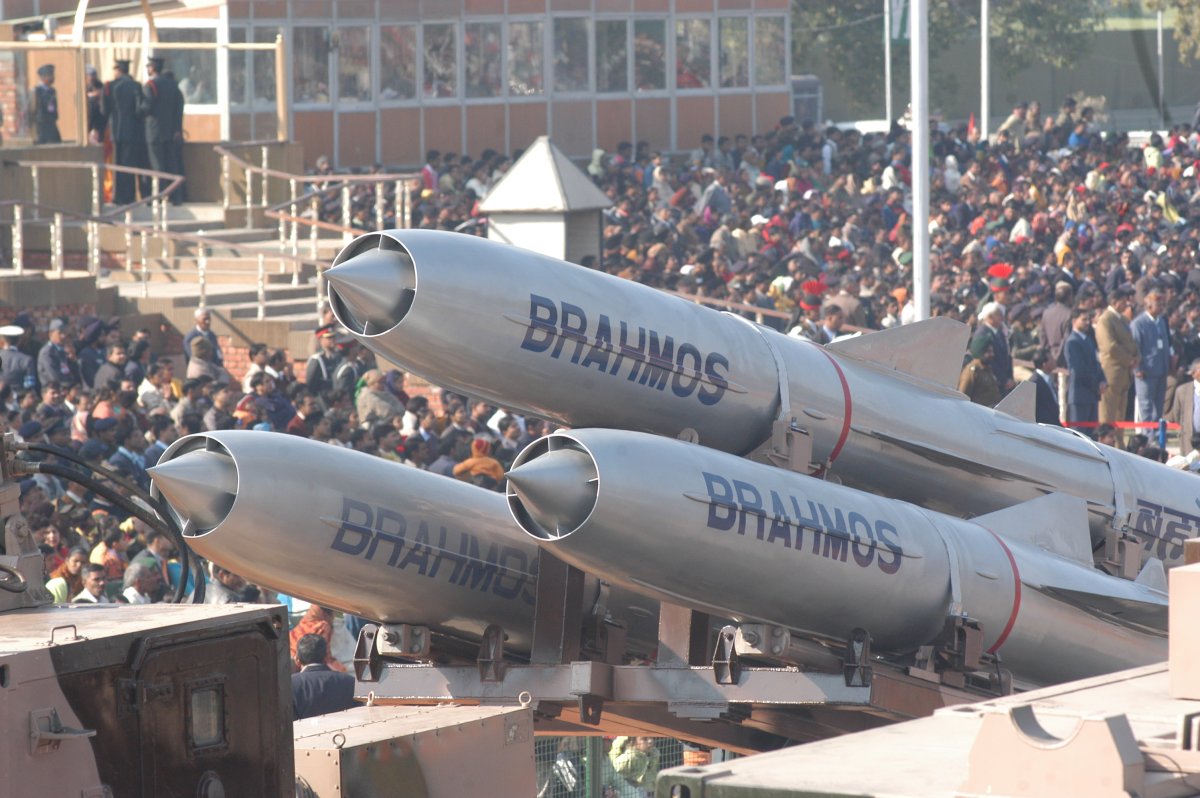The Philippines, a U.S. ally, has hailed as a "game-changer" the delivery of new supersonic missiles that it believes will significantly beef up its coastal defenses amid rising tensions with China.
The first batch of BrahMos cruise missiles, ordered from India two years ago, arrived at Clark International Airport north of Manila on Friday. It was handed over to the Philippine marines to be deployed at an as yet undisclosed location within the country's archipelagic territory.
The high-profile arms transfer comes in the middle of the simmering Philippines-China dispute in the contested Spratly Islands archipelago of the South China Sea, where the Chinese and Philippines coast guards have clashed over territorial features claimed by both sides.
Beijing cites historical rights to all of the sea's islands and reefs, claiming vast maritime zones in the process, while Manila lays claim to territories and traditional fishing grounds within its exclusive economic zone in an area it calls the West Philippine Sea.
The United States backs the Philippines in the maritime dispute and is treaty-bound to defend its oldest ally in Asia should allied service members come under an armed attack.
Jonathan Malaya, the Philippines deputy national security adviser, described the acquisition as a "significant game-changer," the ABS-CBN broadcaster quoted him as saying on Saturday.
Malaya said the system would be deployed once both parts—the missiles and the launchers—had arrived. But Malaya did not elaborate on the delivery schedule.

Manila ordered three batteries of the shore-based, anti-ship variant of the BrahMos cruise missile in a deal with New Delhi worth $375 million. The weapons system is otherwise highly versatile, capable of launching from land, air, sea or undersea against sea or ground targets.
The BrahMos missile is the product of a joint venture between India and Russia, with up to 85 percent of the hardware manufactured in the former.
The missile were delivered on the back of an Indian air force Boeing C-17 Globemaster III, images showed, and the fulfilment highlights India's role as a major arms manufacturer and exporter, at a time when it is also proving itself to be a net security provider amid turmoil in the Red Sea.
And although Beijing and Moscow have grown increasingly close in recent years as part of a joint challenge against the U.S.-led international order, India's latest weapons sale to "China's doorstep" appears to show one of the limitations of the friendship: the Kremlin is unlikely to veto an export at the expense of its historically close ties to New Delhi, even if the capability could give the Philippines an edge over China's forces.
China disapproved of the deal between India and the Philippines, an official suggested.
"The South China Sea issue is a matter between China and some ASEAN countries. China maintains that maritime disputes should be handled properly with countries directly concerned through negotiation and consultation," Liu Pengyu, a spokesperson for the Chinese Embassy in Washington, D.C., told Newsweek in an email.
"Certain non-regional country has sought to stir up trouble and incite confrontation in the South China Sea and jeopardize regional peace and stability. China has always opposed that," Liu said.
The Philippine armed forces, which last fall said it was considering more BrahMos orders, did not immediately respond to a written request for comment. India's Defense and External Affairs ministries and Russia's Foreign Ministry did not respond to separate requests seeking comment.
Don McLain Gill, a geopolitical analyst and lecturer at De La Salle University in Manila, said the BrahMos cruise missile, with an effective range of 180 miles, was "widely known for not being able to be intercepted by any known weapon system."
"This adds an important and practical layer of deterrence for the Philippines amidst the latter's limited military resources vis-a-vis China," he told Newsweek.
"The supersonic cruise missile adds an important enhancement to the Philippines' ongoing roadmap of bolstering its coastal defense to more effectively exercise its sovereignty and sovereign rights in the West Philippine Sea at a time when China has been relentlessly pursuing its expansionist ambitions against international law," Gill said.
India joined the Missile Technology Control Regime in 2016. The multilateral tacit agreement restricts the export of missiles and rockets for payloads of 1,100 pounds for at least 185 miles, as well as their delivery systems.
Pooja Bhatt, an independent maritime security analyst based in New Delhi, told Newsweek: "With the South China Sea situation between China and the Philippines heating up, BrahMos missile adds to Manila's much-needed coastal defense."
"But more importantly, it's strategic signaling to Beijing that Manila has support from several countries, including India, on the South China Sea issue," Bhatt said.
Malaya, the Philippines National Security Council official, told local media over the weekend that the BrahMos missiles would complement the tracking capability offered by radar systems acquired from Japan.
Manila was "not preparing for war," he said.

Uncommon Knowledge
Newsweek is committed to challenging conventional wisdom and finding connections in the search for common ground.
Newsweek is committed to challenging conventional wisdom and finding connections in the search for common ground.
About the writer
Aadil Brar is a reporter for Newsweek based in Taipei, Taiwan. He covers international security, U.S.-China relations, and East Asian ... Read more
To read how Newsweek uses AI as a newsroom tool, Click here.








